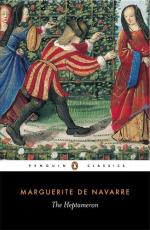A. (Tale VIII., Page i.)
Tales of a similar character to this will be found in the following works written prior to Margaret’s time:—
Legrand d’Aussy’s collection of Fabliaux ou Contes du XIIeme et XIIIeme siecles (vol. iii.).
Boccaccio’s Decameron (day viii., story iv.).
Enguerrand d’Oisy’s Le Meunier d’Aleu.
Poggio’s Facetio ( Vir sibi cornua promovens).
Sacchetti’s Novelle (vol. ii., No. ccvi.).
Morlini’s Novelle (No. lxxix.).
Les Cent Nouvelles Nouvelles (story ix.).
Malespini’s Ducento Novelle (part ii., No. xcvi.).
Of the foregoing, says M. de Montaiglon, Margaret could only have been acquainted with the Decameron, the Cent Nouvelles, and Poggio’s Facetio, which had been translated into French by Tardix (see Nos. cv. and ex. of that translation).
A similar story in Latin verse is also contained in
a fourteenth century
MS. at Monte Cassino. See I codici e le arti
a Monte Cassino, by D.
Andrea Caravita (vol. ii. p. 289).
Since Margaret’s time stories of the same character have appeared in the following works:—
Melander’s Jocondia (p. 298).
Phil. Beroalde’s Contes Latins (see Poggii Imitationes, Noel’s ed., vol. ii. p. 245).
Guicciardini’s Hore di Recreazione (p. 103).
J. Bouchet’s Serees (No. 8; Roybet’s ed., vol. ii. p. 115).
Gabrielle Chapuys’ Facetieuses Journees (p. 213).
La Fontaine’s Contes (book v., No. viii.:_
Les Quiproquo_). Le
Passe-Temps Agreable (p. 27).
Moreover, a song written on the same subject will be found, says M. de Lincy, on folio 44 of the Premier Recueil de toutes les chansons nouvelles (Troyes, Nicholas du Ruau, 1590). It is there called “The facetious and recreative story of a certain labourer of a village near Paris, who, thinking that he was enjoying his servant, lay with his wife.” This song was reprinted in various other collections of the sixteenth and seventeenth centuries.
B (Tale XL (B.), Page 95.)
An anecdote in keeping with this story will be found in Brantome’s miscellaneous works (Petitot’s ed., vol. viii. pp. 382-4). The author of Les Dames Galantes, after alluding to his aunt Louise de Bourdeille—who was brought up at Court by Anne of Brittany—proceeds to say:—




